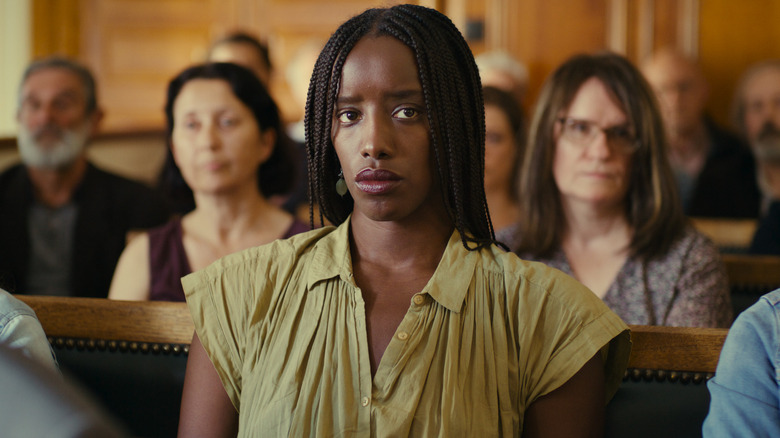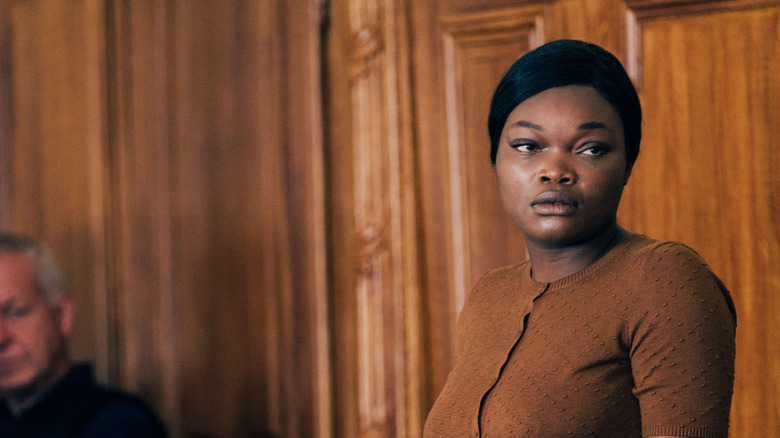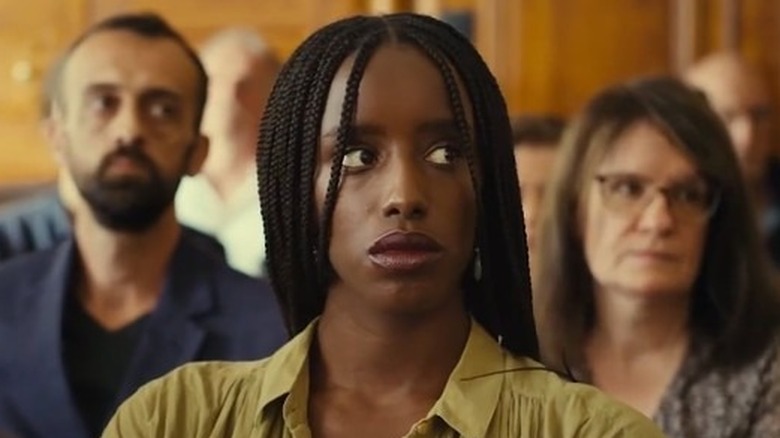Saint Omer Review: Alice Diop's Fiction Debut Aims An Empathetic Lens On A Discomforting Courtroom Subject [NYFF]
Marginalized journalists can bring a perspective that would otherwise be missed by journalists who don't have that lived experience. This kind of subjectivity can allow them insights of a topic, though white-male-mandated "objectivity" can snuff them out of important conversations.
Much discussed — or ignored — are the societal impositions of racial identity when court cases play out in the public eye. White supremacy is a feature, not a bug, of western court systems. And French documentarian Alice Diop's "Saint Omer" sheds a light on the impact of such in her fiction debut. With a humanizing lens, Diop's screenplay (co-written with Amrita David and Marie Ndiaye) adapts the court transcripts from the 2016 infanticide trial of French woman Fabienne Kabou, of which Diop herself had a secondary experience with. "She's Senegalese," Diop thought, as she saw a photo of Kabou in the "Le Monde" newspaper. As a woman of Senegalese descent, Diop found that the case had a hold on her.
Thus, Diop writes a fictional stand-in for her experience: Rama (Kayije Kagame). To write her next book on the subject of the Medea figure (a scorned woman in Greek myths known for murdering her offspring to as revenge against her lover), Rama travels to the town of Saint Omer, France to observe the trial of Laurence Coly (Guslagie Malanga), a Senegalese immigrant and PhD student convicted of leaving her 15-month-old child, Baby Elise, to drown at the sea. A pregnant professor of Senegalese descent, Rama notices the parallels in hers and Coly's background, which begin to stir up some unwanted fears about motherhood as well as her memories with her mother.
Sustained takes
Claire Mathon's cinematography harvests the humanity from the sustained takes, fixating on the judge, the accused, the witnesses, and Rama as one of the courtroom observers. The shots hone in upon their expressions, as the defendant and witnesses absorb cross-examinations spoken off-camera, as if each person has a universe existing inside of them. And in providing an individualized approach, we become keenly aware of the societal imbalances that exist in the mosaic of dialogue.
The camera does not harden Coly, the defendant, into a mythic Medea monster. It doesn't soften her into a paragon of "perfect victimhood" either, and Guslagie Malanga portrays a woman with her own complexities searching to assert her existence. The camera is interested in illuminating a soul with her own interiorities and frailties. When Coly claims no memory of the incident, the judge clocks in that Coly remembers the tides rising on her limbs. Coly retorts that there are some things that can't be explained. These literal discrepancies may seem self-deluding, but we also gather this is the range of her truth as her headspace understands it. (So incomprehensible is her act that she and her mother accuse blame as the reason for Coly's actions, much like in the real case.)
When Coly's white and much older lover (Xavier Ma), the father of the slain child, is called to the stand, his testimony is revealing. Ma plays the fellow as a grieving father while the camera also has us confront how he ducked behind privilege to confront the palpable problems in his relationship with a younger Black woman, whose world only started shrinking when she had a child that remained unregistered.
Invisibility and mothers
By illustrating social undercurrents that are threatening to burst, the film exposes the fissures in the French court. Burrowed under Coly's and her lover's testimonies are systemic injustices that French society would rather shove under the rug, taking their presumptions at the surface-level (Robert Cantarella represents this as the fang-sinking prosecutor). "Saint Omer" peels back the curtain on how society formulates judgments according to a person's race and cultural background while absolving itself of the systemic flaws. The lifeblood of this racism is clear in the French news coverage fixating on Coly's elegant French and a testifier accusing Coly of hiding behind a Wittgenstein philosophy because she did not choose a philosopher "of her culture."
"Saint Omer" says much about the ever cascading psychological and societal impact of invisibility, starting with the invisibility of the Senegalese immigrant community (i.e. forcing them to erase their culture to assimilate) in French society. This invisibility extends to both Rama and Coly, who have a shared history of fraught relationships with their immigrant mothers. So Rama's meeting with Coly's mother (a fierce Salimata Kamate) strikes with visceral impact. There are dimensions insinuated in how Kamate carves out Coly's mother, such as when she pegs Rama as pregnant and boasts how she raised Coly to be decent and respectful in French society. We feel Rama swallowing her discomfort, as if she senses this mother forbade flaws in her daughter, even if her maternal teachings came from a place of love and immigrant self-preservation.
Interspersed delicately with the proceedings are Rama's childhood reflections, not quite told through traditional-feeling "flashbacks" but a history lyrically knitted into the present. These glimpses of her relationship with her mother are rendered as mutual taciturnity yet announces plenty about the pair's dynamic cloaked with a solemn obliqueness. Consider the scene where the mother snaps on her bracelets and a young Rama sits next to her. Despite the literal closeness, their respective alienation is as thick as a conspicuous fog.
Rama does not directly interact with the defendant — save for one exchange of glances that crumble down the walls of Rama's composure that heralds a typhoon of emotions. There, she realizes that she can't unsee herself in Coly.
/Film Rating: 9.5 out of 10


